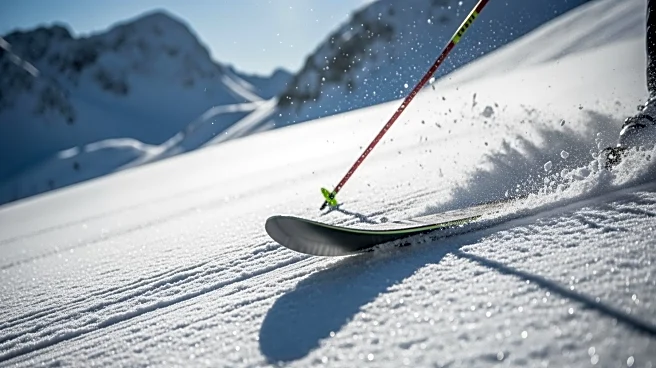What's Happening?
Lucas Pinheiro Braathen has made history by winning the opening slalom of the World Cup season, marking Brazil's first victory in a top-level ski race. The event took place in Levi, Finland, and Braathen's win comes just three months before the men's
slalom at the Milan Cortina Winter Olympics. Braathen, who previously competed for Norway, switched to represent Brazil, his mother's native country, last year. This victory is his sixth career win but the first since his transition to the Brazilian team. Braathen's performance was notable as he maintained a strong lead from the first run, ultimately defeating 2022 Olympic champion Clement Noel of France by 0.31 seconds.
Why It's Important?
This victory is significant as it not only represents a personal triumph for Braathen but also elevates Brazil's presence in the Alpine skiing world, a sport traditionally dominated by European countries. Braathen's success could inspire a new generation of Brazilian athletes to pursue winter sports, potentially diversifying the country's athletic representation. Additionally, his journey highlights the challenges and opportunities faced by athletes who switch national allegiances, often for personal or professional reasons. Braathen's win underscores the importance of individuality and perseverance in sports, as he has overcome a challenging path to achieve this milestone.
What's Next?
Following this victory, Braathen is expected to continue competing in the World Cup circuit, with the next men's slalom scheduled in Gurgl, Austria. His performance will be closely watched as he prepares for the upcoming Winter Olympics, where he aims to secure Brazil's first Olympic medal in Alpine skiing. The broader skiing community will also be observing how Braathen's success influences the sport's popularity in Brazil and whether it leads to increased investment and interest in winter sports within the country.
Beyond the Headlines
Braathen's story also touches on broader themes of identity and belonging, as he navigates his dual heritage and the complexities of representing a country with limited winter sports infrastructure. His decision to compete for Brazil, despite the challenges, highlights the personal and cultural dimensions athletes often consider in their careers. This development could prompt discussions on the support systems available for athletes from non-traditional winter sports nations and the potential for globalizing sports traditionally dominated by a few countries.
















